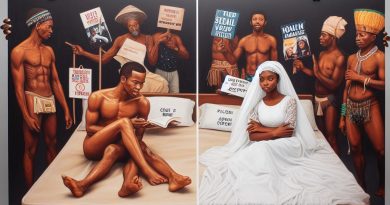Novels That Perfectly Capture Nigerian Marriage Dynamics
Last Updated on January 28, 2024
Introduction
Nigerian marriage dynamics encompass a wide range of cultural practices and societal expectations.
Literature plays a vital role in helping us comprehend the complexities of marriage in Nigeria.
Thesis statement: This blog post will delve into novels that offer insightful portrayals of Nigerian marriage dynamics.
Nigerian marriage dynamics are a complex tapestry interwoven with cultural traditions and societal norms.
Through rich and captivating narratives, literature serves as a window into the multifaceted nature of these unions.
Novels play a crucial role in our understanding of Nigerian marriage dynamics.
They allow readers to explore the intricacies of relationships, family structures, and gender roles within the context of Nigerian society.
By immersing ourselves in these literary works, we gain insights into the challenges and triumphs that define marriage in Nigeria.
One notable novel that beautifully depicts Nigerian marriage dynamics is “The Joys of Motherhood” by Buchi Emecheta.
Set in 20th century Nigeria, the story follows the life of Nnu Ego, a woman striving to find fulfillment through motherhood and marriage.
Through Nnu Ego’s journey, Emecheta sheds light on the pressures and sacrifices imposed by societal expectations.
Another captivating novel is “Americanah” by Chimamanda Ngozi Adichie.
While primarily exploring themes of race and immigration, the novel also presents a compelling portrayal of love, marriage, and cultural identity in Nigeria.
Adichie’s exploration of the complexities of marriage resonates with readers, as she navigates the challenges faced by her characters with honesty and nuance.
Basically, literature serves as a powerful tool in understanding Nigerian marriage dynamics.
Novels like “The Joys of Motherhood” and “Americanah” provide valuable insights into the intricacies of relationships and family structures.
By delving into these works, we can gain a deeper appreciation for the diverse and ever-evolving nature of Nigerian marriages.
“The Secret Lives of Baba Segi’s Wives” by Lola Shoneyin
Summary of the novel’s plot and main characters
The Secret Lives of Baba Segi’s Wives is a captivating novel that delves into the complexities of marriage in Nigerian society.
Set in modern-day Nigeria, the story revolves around Baba Segi, a wealthy and traditional businessman who has four wives.
Each wife has her own distinct personality and motivations, making them captivating characters.
Bolanle, the newest and youngest wife, disrupts the peaceful existence of the other three wives who have spent years navigating the dynamics of Baba Segi’s household.
Portrayal of polygamy in Nigerian culture and its impact on marriages
The novel provides valuable insights into the institution of polygamy and its multifaceted impact on Nigerian marriages.
It highlights the societal acceptance of polygamy, the economic and social benefits it offers to men, and the challenges and power imbalances it creates for women.
Through the lens of Baba Segi’s marriages, the reader witnesses the inequalities and struggles that arise from sharing a husband.
The pressure to bear children, the competition for attention and affections, and the emotional toll of coexisting with rival wives are all explored within the novel.
Power dynamics among the wives and their relationship with Baba Segi
The power dynamics among the wives in Baba Segi’s household are intricate and ever-shifting.
Iya Segi, the first wife, seems to hold the most influence due to her years of experience and knowledge of Baba Segi’s preferences.
Sikirat, the fourth wife, is presented as the outcast, often ridiculed by the other wives due to her lowly background.
Yet, Sikirat possesses resilience and resourcefulness that allow her to navigate the complex dynamics within the household.
Baba Segi, although initially portrayed as a patriarchal figure, is gradually revealed to have his own vulnerabilities and regrets.
As the story unfolds, the reader witnesses his transformation from a domineering husband to someone capable of recognizing the strength and intelligence of his wives.
How the novel offers insights into gender roles and societal expectations within Nigerian marriages
“The Secret Lives of Baba Segi’s Wives” sheds light on the gender roles and societal expectations deeply ingrained in Nigerian marriages.
The novel presents a nuanced exploration of the traditional expectations placed upon women, such as the pressure to bear children and maintain the family’s reputation.
However, it also challenges these expectations by giving agency and complexity to the female characters, who defy traditional norms in various ways.
Bolanle, for example, disrupts the established order by pursuing her education and seeking independence despite the constraints of her marriage.
The novel serves as a commentary on the societal expectations placed on women in Nigeria and highlights the need for a more equitable and inclusive approach to marriage and gender dynamics.
Therefore, “The Secret Lives of Baba Segi’s Wives” is a thought-provoking novel that skillfully captures the intricate marriage dynamics in Nigerian society.
By delving into the portrayal of polygamy, the power dynamics among the wives, and the societal expectations on gender roles, the novel offers valuable insights into the complexities of Nigerian marriages.
Read: Rekindling Love: Pro Tips from Top Nigerian Marriage Counselors
“Americanah” by Chimamanda Ngozi Adichie
Overview of the novel’s storyline and main characters
Americanah, written by Chimamanda Ngozi Adichie, tells the story of Ifemelu, a young Nigerian woman who moves to the United States for studies and subsequently builds a successful career as a blogger, writing about race and identity.
The novel also explores her tumultuous love affair with Obinze, her childhood sweetheart in Nigeria, who later becomes an undocumented immigrant in the UK.
The Nigerian immigrant experience and its influence on marriages
Through Ifemelu’s character, the novel delves into the Nigerian immigrant experience and its impact on marriages.
The challenges faced by Nigerian immigrants, such as cultural adjustment, racism, and economic struggles, often put a strain on their relationships.
The pressures of assimilating into a new society while holding onto their Nigerian identity can lead to tensions within marriages.
Cultural clashes and identity struggles faced by the protagonist in her relationships
Ifemelu’s relationships, both romantic and platonic, are marred by cultural clashes and identity struggles.
As an educated Nigerian woman living in America, she faces stereotypes, racism, and a constant negotiation of her identity.
These issues affect her interaction with others, especially her partners, leading to misunderstandings, conflicts, and a sense of displacement.
Interracial relationships and their challenges in the context of Nigerian marriages
“Americanah” also delves into the complexities of interracial relationships within the context of Nigerian marriages.
Ifemelu’s relationship with her African-American boyfriend, Blaine, highlights the challenges of navigating racial dynamics and cultural differences.
The novel explores the tensions that arise from conflicting worldviews and societal expectations, shedding light on the complexities of interracial love within the Nigerian cultural framework.
Overall, “Americanah” masterfully captures the intricate dynamics of Nigerian marriages by examining the sociocultural challenges faced by its characters.
Through Ifemelu’s journey as a Nigerian immigrant and her experiences in love and marriage, the novel offers insight into the complexities of identity, assimilation, and the impact of cultural clashes on relationships.
Adichie’s skillful storytelling allows readers to deeply empathize and understand the nuances of Nigerian marriage dynamics in the context of modern society.
Read: Couples Retreats vs. Traditional Counseling: What Works Best?

“Purple Hibiscus” by Chimamanda Ngozi Adichie
Summary of the novel’s plot and key characters
“Purple Hibiscus” is a captivating novel set in Nigeria, following the story of Kambili, a teenage girl raised in a strict and abusive household.
Kambili lives with her authoritarian father, Eugene, who is deeply religious, and her submissive mother, Beatrice.
The novel explores their family dynamics and the impact of domestic violence on their lives.
Kambili’s life takes a turn when she visits her aunt, Ifeoma, and her cousins, Amaka and Obiora.
Here, she experiences a different kind of family environment – one filled with love, freedom, and intellectual stimulation.
This contrast between her aunt’s household and her own begins to shape Kambili’s understanding of marriage and family.
Portrayal of domestic violence and its impact on Nigerian marriages
“Purple Hibiscus” vividly depicts the destructive effects of domestic violence on Nigerian marriages.
Eugene, Kambili’s father, is a revered figure in public but abuses his family in private.
Adichie skillfully reveals the psychological and physical toll that this violence takes on both Beatrice and Kambili.
This portrayal sheds light on the prevalent issue of domestic violence within Nigerian society and raises questions about the silence and stigma surrounding it.
Adichie emphasizes the urgent need for change and challenges societal norms that perpetuate such abuse within marriages.
Role of religion and its influence on family dynamics
Religion plays a significant role in “Purple Hibiscus,” particularly in shaping the Adichie effectively portrays how religion can be manipulated to justify and perpetuate abuse within Nigerian marriages.
Eugene’s extreme religious practices create an atmosphere of fear in his household.
However, Kambili’s exposure to different interpretations of religion through her aunt showcases how faith can also be a source of liberation.
Ifeoma’s religious beliefs promote love, understanding, and tolerance, contrasting with Eugene’s strict and oppressive religious observance.
The protagonist’s coming-of-age journey and how it reflects changes in her understanding of marriage and love
Kambili’s coming-of-age journey in “Purple Hibiscus” is intertwined with her evolving understanding of marriage and love.
Initially, Kambili internalizes her father’s abusive behavior as a necessary part of love.
However, as she spends time with her aunt’s family, Kambili witnesses a healthier and more genuine expression of love.
This experience prompts her to question the distorted version of love she has known, giving her the courage to challenge her father’s control and seek a better future for herself and her family.
Throughout the novel, Kambili’s growth represents a shift in traditional Nigerian marriage dynamics.
Her realization that love should not be based on fear and violence inspires her to reject the oppressive patriarchal norms of her society and envision a marriage based on equality and respect.
In fact, “Purple Hibiscus” by Chimamanda Ngozi Adichie offers a compelling exploration of Nigerian marriage dynamics.
The novel’s depiction of domestic violence exposes the toxic nature of abusive relationships and highlights the urgent need for change within Nigerian society.
Furthermore, Adichie’s examination of the role of religion emphasizes the power it holds in shaping family dynamics and calls for a more tolerant and loving approach.
Finally, Kambili’s coming-of-age journey reflects a crucial shift in understanding marriage and love, offering hope for breaking free from oppressive traditions.
Adichie’s masterful storytelling makes “Purple Hibiscus” an essential read for anyone interested in understanding Nigerian marriage dynamics.
Read: A Comparative Analysis: Marriage Duas vs. Love Spells
“Stay with Me” by Ayobami Adebayo
Overview of the novel’s story and main characters
“Stay with Me” by Ayobami Adebayo is a beautifully written novel that delves into the complexities of Nigerian marriage dynamics.
The story revolves around the lives of Yejide and Akin, a young couple deeply in love.
Yejide and Akin are faced with societal pressure and expectations to have children.
As a result, they embark on a journey filled with emotional highs and lows, as they struggle to conceive and maintain their marriage.
Main Characters
- Yejide: A strong and independent woman who longs for motherhood while facing the challenges of infertility.
- Akin: Yejide’s loving and dedicated husband, caught between his desire for children and societal expectations.
- Iya Martha: Akin’s mother, representing the societal pressure for procreation and the traditional views on marriage.
- Funmi: Yejide’s best friend, a source of support, and one who challenges societal norms.
Societal pressure for procreation and its impact on marriages
In Nigerian society, the pressure for procreation is immense.
Couples are expected to bear children, preferably male heirs, to continue their family lineage.
In “Stay with Me,” this pressure takes a toll on Yejide and Akin’s marriage.
Their inability to conceive leads to feelings of shame and inadequacy.
They face constant judgment from family, friends, and society, which affects their self-esteem and puts a strain on their relationship.
The pressure to produce children creates a sense of desperation and hopelessness.
Complex emotions and conflicts arising from infertility issues
The novel masterfully explores the emotional turmoil experienced by Yejide and Akin due to their infertility.
Each unsuccessful attempt at conceiving a child deepens their despair and triggers conflicts within themselves and with each other.
Yejide struggles with feelings of inadequacy and fears losing her husband’s love.
Akin battles with his own guilt and societal expectations.
Both characters experience grief, frustration, and moments of resentment towards each other.
Infertility also heightens the susceptibility to external influences, leading the couple to explore unconventional methods to conceive.
These choices further complicate their relationship and intensify their emotional struggles.
Theme of sacrifice and compromise in Nigerian marriages
“Stay with Me” presents a thought-provoking examination of the theme of sacrifice and compromise in Nigerian marriages.
Yejide and Akin are forced to make difficult choices and sacrifices due to societal pressures and the desire to fulfill expectations.
Yejide’s willingness to do whatever it takes to conceive puts her physical and emotional well-being at risk.
Akin, torn between his love for Yejide and societal pressures, is faced with making choices that challenge his own beliefs and principles.
The novel highlights the ways in which Nigerian marriages often require individuals to suppress their own desires for the sake of preserving the relationship and meeting societal expectations.
In general, Ayobami Adebayo’s novel “Stay with Me” offers a poignant and honest portrayal of Nigerian marriage dynamics.
Through the story of Yejide and Akin, the societal pressure for procreation, the emotional toll of infertility, and the theme of sacrifice and compromise are explored in a compelling manner.
This novel serves as a crucial reflection on the complex dynamics that shape marriages in Nigerian society.
Read: Understanding Biblical Marriage: A Deep Dive into Genesis
Discover More: The Role of In-laws: Stories from Newlyweds in Nigeria
Conclusion
The novels discussed in this blog section have provided invaluable insights into Nigerian marriage dynamics.
By delving into the complexities of relationships, cultural expectations, and gender roles, these authors have highlighted the challenges faced by couples in Nigeria.
Chinua Achebe’s “Things Fall Apart” showcased the clash between traditional values and the influence of colonialism on marriage.
By portraying the protagonist’s struggle to balance his desires with societal expectations, Achebe offers a nuanced understanding of Nigerian marriage dynamics.
Chimamanda Ngozi Adichie’s “Americanah” explores the impact of migration on relationships and the evolving perceptions of marriage in a globalized world.
By addressing issues of race, identity, and infidelity, Adichie reflects the changing dynamics within Nigerian marriages.
Buchi Emecheta’s “The Joys of Motherhood” presents the challenges faced by women in a patriarchal society, highlighting the sacrifices and societal pressures that can affect marital relationships.
Emecheta’s novel offers a unique perspective on the intricacies of Nigerian marriage dynamics.
Literature plays a crucial role in depicting societal issues, including marriage dynamics.
By presenting nuanced portrayals of relationships, authors enable readers to empathize with the complexities faced by couples in Nigeria.
Fostering discussions around marriage dynamics in Nigeria through literature is of utmost importance.
It allows for a deeper understanding of cultural norms, helps challenge harmful stereotypes, and encourages dialogue towards positive change.
By exploring the rich tapestry of Nigerian marriage dynamics through literature, readers can gain valuable insights into the intricacies of relationships and foster a more empathetic and enlightened society.


